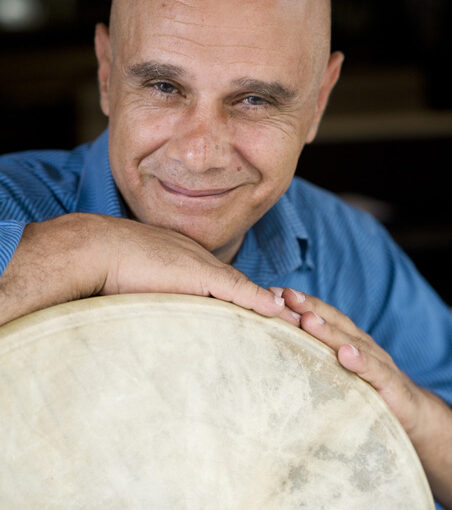PURPOSE
- Develop skills through analysis of theoretical and practical concepts
- Improve musical knowledge and instrumental technique
- Develop analytical and listening skills
- Broaden your practice of the classical and modern Arabic rhythmic repertoire through a variety of playing styles
EDUCATIONAL CONTENT
This is an innovative teaching method, which will be articulated by following 3 pedagogical methods :
> Numerous exercises to help develop motor expression and the technique needed to play rhythms and their vocabulary and variations.
> Sessions to develop modes of interpretation and improvisation
> Sessions to put into practice what has been learned at the end of each day.
PROGRAM
Scores will be sent to you upon receipt of your registration.
- Basic rhythms needed to compose all rhythms, whatever their metric (two- and three-unit rhythms – active, semi-active, non-active)
- Binary rhythms 4/8: subdivided 2+2. Ayub, Karachi, Malfouf… subdivided 2+2
- Binary rhythms: 8/8: Massmoudi 2+2+ 2+2, Qataqoufti 3+2+3, Wihdeh Kabirah 3+3+2
- Binary rhythms 6/8: Darej khaliji, Darej masri,, Qantara subdivided 2+2+2 and Mizan al darj, Okruk and York Samai subdivided 3+3
- Odd rhythms in 5/8: Thouraya 2+3 and 3+2
- Odd rhythms in 7/8: Dawer Hindi subdivided 3+2+2 and 7/16: Mandira subdivided 2+2+3, then 2+3+2 and 3+2+2
- Odd rhythms in 9/8: Aqssaq subdivided 2+2+2+3, 2+2+3+2, 2+3+2+2, 3+2+2+2
- Odd rhythm Samai Thakqeel 10/8: subdivided 3+2+3+2
- Georgina odd rhythm 10/16 subdivided 3+2+2+3
TERMS OF PARTICIPATION
Each participant will bring, if possible, an oriental percussion instrument (Riqq, Daf, Darbouka…). If necessary percussion instruments can be provided by the organization.
REGISTER NOW
>> ON-LINE REGISTRATION <<
>> RATES & REGISTRATION PROCESS <<
BIOGRAPHY
Born in 1967, he began playing percussion at the age of seven, studying philosophy and musicology and researching rhythm in various cultures (Indian, Cuban, African, Latin). Now a specialist in oriental percussion, he has mastered a variety of musical traditions, which he blends into his playing to create a unique, refined and creative style praised by connoisseurs.
He taught for 8 years at the Edward Saïd National Conservatory of Music (East Jerusalem, Ramallah, Bet Lehem) and for ten years at Beit Al Musica (Galilee). He teaches university seminars and master classes (Festival de Salvador de Bahia (Brazil), Universities of Gothenburg (Sweden) and Aarhus (Denmark), Guildhall School (London). He leads percussion workshops designed to introduce young audiences to oriental music and the styles of diverse cultures. Other art-therapy workshops are close to his heart: for battered women, handicapped children, prisoners, etc., the aim is to develop personal expression, intercommunication and group dynamics. This wealth of experience has led him to develop an original teaching method for rhythm and percussion.
He has performed with a wide variety of ensembles: Simon Shaheen (classical oud), Süleyman Erguner (classical Ottoman and contemporary Turkish music), Aka Moon (modern jazz), Marie Keyrouz’s Ensemble de la Paix (sacred music), the Occitan group Lo Cor de la Plana, Rula Safar (baroque music), Issa Hassan (Kurdish bouzouq), the Saltanah ensemble with Dorsaf Hamdani, Ibrahim Maalouf (fusion), with Bratsch (Balkan, gypsy, oriental influences), Elie Maalouf (oriental jazz), Abed Azrie (contemporary Sufi), Karloma (contemporary Palestinian music) and the Oriental Music Ensemble (traditional Palestinian music). He has accompanied the Trio Joubran since 2007, with Ahmad al Khatib (Oud and contemporary oriental music) since 1998, with Huber Dupont (jazz) since 2010 and with duo Sabil with flamenco dancer Rocio Molina.
He has composed and performed for the theater at Al Laz (Saint Jean d’Acre), Al Midan (Haifa), Al Nikab (Usefia) and at the Saint Jean d’Acre Alternative Theater Festival.
He has also composed for the movies Le dernier vol (by Karim Dridi) and Fix me (by Raed Andoni).
He has recorded with Suheil Khoury, Marie Keyrouz, Elie Maalouf, Issa Hassan, Trio Joubran, Khoury Project, Compagnie Montanaro, Abed Azrie, Bratsch, with Duo Sabîl a duo album with oud master Ahmad Al Khatib, with Karloma, with Hubert Dupont and Ensemble Jasmin, with Duo Sabîl and Quatuor Bèla, in Sirventés with Manu Théron and Gregory Dargent and with LilaBox.
